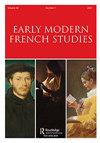Linguistic and Material Counterculturalism in the French Renaissance: Claude Fauchet’s Recueil de l’origine de la langue et poesie françoise (1581)
IF 0.1
3区 历史学
Q2 HISTORY
引用次数: 1
Abstract
Our current paradigm of sixteenth-century French vernacular discourse can be epitomized on the one hand by the classically inspired poetics of translatio propounded by the Pléiade, and on the other, by the scholarly efforts to establish a noble genealogy for the French language by writers such as the printer and Hellenist Henri Estienne. This picture, however, merely constitutes one of several sixteenth-century narratives regarding the French vernacular. Claude Fauchet’s Recueil de l’origine de la langue et poesie françoise (1581) provides evidence of a lively and appreciative interest in medieval French poetry among a group of Parisian jurist-humanists whose valorization of medieval French textual and material culture was developed in direct opposition to the dominant tenor of contemporary vernacular discourse which sought to break away from France’s medieval past. Fauchet in particular is notable for his seminal contribution to French literary history, his keen awareness of the role of vernaculars in history, and his sensitivity towards the material aspects of France’s native past.法国文艺复兴时期的语言和物质反文化主义:克劳德·福切的语言和诗歌起源汇编francoise (1581)
我们现在的16世纪法语方言话语的范例,一方面是由plazimiade提出的受古典启发的翻译诗学的缩影,另一方面,是由像印刷工和希腊学者亨利·艾斯安这样的作家为法语建立一个高贵的谱系所做的学术努力的缩影。然而,这幅画仅仅构成了16世纪关于法国方言的几个叙述之一。克劳德·福歇的《法语和法语诗歌的起源》(1581)证明了一群巴黎法学家-人文主义者对中世纪法国诗歌的生动和欣赏的兴趣,他们对中世纪法国文本和物质文化的评价是在与当代白话话语的主导地位直接对立的情况下发展起来的,这种话语试图摆脱法国的中世纪过去。福歇尤其以其对法国文学史的开创性贡献而闻名,他敏锐地意识到方言在历史中的作用,以及他对法国本土过去的物质方面的敏感。
本文章由计算机程序翻译,如有差异,请以英文原文为准。
求助全文
约1分钟内获得全文
求助全文
来源期刊

Early Modern French Studies
Multiple-
CiteScore
0.10
自引率
0.00%
发文量
14
期刊介绍:
Early Modern French Studies (formerly Seventeenth-Century French Studies) publishes high-quality, peer-reviewed, original articles in English and French on a broad range of literary, cultural, methodological, and theoretical topics relating to the study of early modern France. The journal has expanded its historical scope and now covers work on the sixteenth, seventeenth, and eighteenth centuries. Within this period of French literary and cultural history, the journal particularly welcomes work that relates to the term ''early modern'', as well as work that interrogates it. It continues to publish special issues devoted to particular topics (such as the highly successful 2014 special issue on the cultural history of fans) as well as individual submissions.
 求助内容:
求助内容: 应助结果提醒方式:
应助结果提醒方式:


